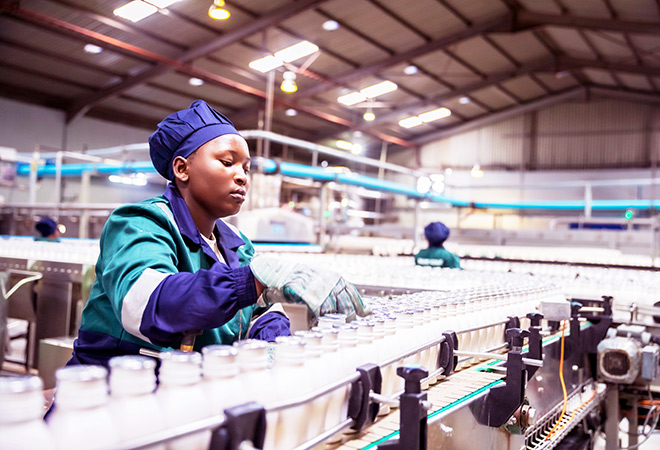
The emergence of COVID-19 from Wuhan, China in December 2019 was declared a global health emergency on January 30 and
a pandemic by WHO on March 11, 2020. The impact of the pandemic was
likened to another World War II exposing the fragile healthcare systems as well as the economy of the most powerful countries like United States, United Kingdom among many other.
What first started as a health crisis has now transformed into political catch-22s, social disruptions, economic disasters and environmental dislocations.
In the midst of Covid-19 global drama between the super powers acting out their orchestrated scripts, we are missing the critical question - Where is Africa placed in the global equations of Covid-19? Would the pandemic be another opportunity for the
1884 Berlin Conference where Africa was partitioned or the new scramble for the soul of Africa? Which trajectory would Africa’s development be headed towards in the short, medium and longer term?
Human-health impacts
The flattening of the COVID-19 curve is dependent on several factors. The
WHO DG in his address with some member states calls on world leaders to show global solidarity in the pandemic’s fight. The challenge with flattening the curve is - lack of action in any country would lead to the spread of the virus in other countries as the virus does not take into account state borders, race, religion, status, tribes and colours. This is a war we must win together.
Since the
first recorded case of Covid-19 in Africa in Egypt on 14 February, 2020, the continent exceeded the 1 million mark on 14 August 2020 with 25,096 deaths and 812,839 recoveries according to
Africa CDC update. In the wake of the pandemic,
Melinda Gates predicted how dead bodies may be lying all over the streets of Africa while
UNECA report predicted over 300,000 deaths to be reported in the continent and
WHO predicted the number of deaths at 190,000. Though the continent contrary to some of the predictions in terms fatalities is surviving, the impacts on human capital is huge and the consequence will in a way retard Africa’s development now and in the near future. This is well stated by the Ghanaian
President Akufo Addo in his address to the nation “
I assure you that we know what to do to bring back our economy back to life. What we do not know how to do is to bring people back to life” Indeed, a single life lost to Covid-19 is a big minus for Africa’s development.
Economic impacts
In the wake of Covid-19, the IMF called the economic woes from the pandemic
as the worst since 1930s depression. The impact of the pandemic on the
global economy could be as high as US$8.8 trillion. The pandemic is already leading the world closely into another global recession with per capital income shrinking for many countries since 1870 according to
World Bank report. As a total output loss for Africa in 2020, a
World Bank report estimated between US$37 billion and US$79 billion.
Another report highlights that approximately 150 million jobs will be affected as a result of Covid-19. Nigeria which is the most populous and biggest economy in Africa has
projected its economy to contract by 3.2% in 2020 – that is if the pandemic is contained by third quarter of the year. South Africa, the second largest economy on the continent was the most hit by COVID-19 -
crossing half a million mark with 8,153 deaths on August 2, 2020. The economic devastation posed by the pandemic to the South African economy on its GDP is projected to contracts by 7.2% in 2020
according to a report. The impact of Covid-19 on the agriculture sector has resulted in
deepening food crisis and food insecurity throwing many into hunger, malnutrition and poverty. The pandemic continues to affect small-scale farm holders in Africa due to limited access to their farms, inputs or markets.
According to a study, small-scale farm holders constitute to over 60% of total agriculture output and about 23% of the continent’s GDP.
Social impacts
The social setting in many African countries is of communal type of co-existence. This is closely linked with the culture of the people. In the wake of Covid-19, this social capital was dislocated as the gospel of ‘
stay at home and social distancing’ was high on the preventive measures. The social support which could have helped both physically and mentally was eroded by Covid-19. The impacts is also resulting into
increasing mental health problems in Africa. The rate of domestic violence also soared. Kenya for example recorded a
huge spike in cases domestic violence within two weeks in the pandemic. The continent in which majority of the population
(85%) lives on less than US$5.50/day with their means of livelihood anchored on daily work pay, the stay at home, social distancing and other measures by government met with some resistance. If given a choice, such people would prefer leaving their houses to fend for daily living and face dying of covid-19 or survive it than stay at home and die of hunger.
Environmental impacts
The environment witnessed a slight of relief in terms of increasing Greenhouse gas (GHG) emissions as global CO
2 emissions reduced by -17% in the first few weeks of April 2020 as opposed to the mean value in 2019 according to
a report. The
global price of oil oscillations is a pointer to this fact. This gain in emission reduction however
may be short-lived as the lockdown eases. While
Africa is the most vulnerable continent to the impacts of climate change with least capacity to adapt; therefore, a gain, no matter how small for the global climate is a gain for Africa. The continent will
require about US$3 trillion investment to implement its climate Nationally Determined Contributions (NDCs). Ironically, with the Covid-19 lockdowns it was expected that some gains will be made in reducing the rate of deforestation to help the climate, which was rather
more than doubled in Asia and South America as indicated by another
report.
Africa’s Responses
From
Cairo to
Cape Town and from
Dar Salaam to
Dakar, African countries like other country of the world adopted various measures to fight against the pandemic. While the steps taken to tackle Covid-19 is one thing the effectiveness of those actions is another thing entirely.
The major responses on the continent include but not limited to the following:
Government Covid-19 regulations; Government palliatives; Government bailouts; The borrowings, the loans and calls for debt relief and/or cancellations; Recruitment of adhoc medical staff, provision of PPE especially for health practitioners, erection of temporary testing and treatment centres, upgrading selected health centres etc.
What Next?
Homegrown solutions are critical for Africa’s development as well as its response to Covid-19. This has become critical as most infrastructures such as health, communications, road systems and the likes are obsolete and can no longer stand the current stresses and test of time as revealed by Covid-19 situations. Digitization of Africa agriculture and other critical sectors is now more than ever desirable while the African Continental Free Trade Area (AfCFTA) should be urgently operationalised.
Attention should be focused on the key issues and sectors in the immediate, medium and longer-term green recovery strategies for the continent to recover in a more resilient, stronger, greener and better way. These issues and sectors are:- Policy reviews and reforms; Infrastructural upgrade; Investment in R&D, technological innovations; Deliberate increase in budgetary allocations to critical sectors such as agriculture, environment, manufacturing, ICT, Health, Emergency Preparedness and Response, education to mention but a few.
Conclusion
As the race to find a cure and/or vaccine for Covid-19 gains momentum, the world waits to see whether the vaccine would be provided free as public goods as suggested by
WHO and some member states . On the flip side, if it is commercialised, then the economics associated with Covid-19 will start to manifest. The divide between who is producing and at what cost and who is buying would also become thick. On which side of the divide will Africa stand will become one of the determinants of its development in the short, medium and longer term. Moreover, Africa should not wait for the world to come with solution kits but rather should take its own solution to the world. The continent has everything it takes to be a solution provider -
A continent too rich to be poor.
The views expressed above belong to the author(s). ORF research and analyses now available on Telegram! Click here to access our curated content — blogs, longforms and interviews.



 The emergence of COVID-19 from Wuhan, China in December 2019 was declared a global health emergency on January 30 and
The emergence of COVID-19 from Wuhan, China in December 2019 was declared a global health emergency on January 30 and  PREV
PREV


